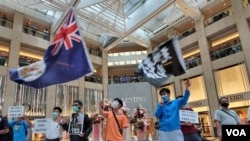Hundreds of activists and ordinary citizens in Hong Kong marked the first anniversary of the city’s anti-government movement by staging protests in seven shopping malls across the Asian financial hub on Tuesday.
The throng of demonstrators chanted pro-democracy slogans and displayed banners saying “Hong Kong Independence” and “Liberate Hong Kong, Revolution of our times." The crowds also sang choruses of “Glory to Hong Kong,” the unoficial anthem of the movement.
“I came with a heavy heart, the young people have given so much to this movement. They did it not for themselves but for Hong Kong, for justice. I owe them too much,” said a 53-year-old man who gave his name as Roger. He was referring to the more than 8,900 people, of whom about 40% were students, who have been arrested in more than 1,000 protests since June of last year.
With the looming national security laws imposed by China many said they wouldn’t stop the resistance but would take a more cautious approach. The new law is expected to be enacted within the next few months.
On June 9 last year, some one million Hong Kongers staged a peaceful protest against a proposed extradition law that would allow individuals to be sent to China for trial. The government at the time insisted on pressing ahead with the law, prompting more people to take to the streets in a series of mass protests that plunged the former British colony into one of the deepest crises in its history.
Intending to stamp out protests, China’s legislature in late May passed a plan to force sweeping national security laws on Hong Kong to prevent and punish “acts and activities” that threaten national security, including advocacy of secession, subversion, terrorism and foreign interference. Bypassing Hong Kong’s legislature, China’s vaguely defined national security laws will be applied to Hong Kong through an annex of the city’s mini-constitution, the Basic Law. The legislation would also allow Chinese national security organs to set up agencies in Hong Kong.
A 14-year-old boy in a school uniform said his first protest on June 9 last year was an eye-opening experience. “Last year we were fighting against the extradition law, this year we're fighting against the national anthem and national security law,” he said. “Now I know how brutal police can be and how horrific the regime can be.”
The scale of protests has markedly reduced in recent months, after the onset of the Coronavirus epidemic in early January. Police have repeatedly turned down applications for demonstrations, citing coronavirus restrictions. Many activists who have turned up at unapproved protests have been charged with participating in illegal assembly.
In April, 15 high-profile pro-democracy figures, including Martin Lee and Jimmy Lai, were arrested on the charge of illegal assembly for taking part in protests last year that had not been sanctioned by police.
Protests were also scheduled to take place on Tuesday evening.
Asked by reporters about the year-old protest movement, Hong Kong’s leader, Carrie Lam, said everyone needs to "learn a lesson" from the challenges and people should understand that Hong Kong cannot cope with “chaos.” She lambasted a call for a general strike over the new security laws when the city is facing economic recession.
An alliance of more than 20 labor unions and a students' group have planned to hold a referendum on June 14 to ask members whether they would go for a general strike to protest the laws imposed by Beijing.




